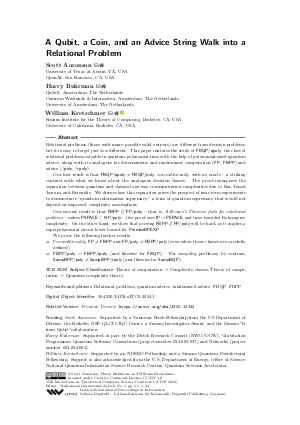@InProceedings{aaronson_et_al:LIPIcs.ITCS.2024.1,
author = {Aaronson, Scott and Buhrman, Harry and Kretschmer, William},
title = {{A Qubit, a Coin, and an Advice String Walk into a Relational Problem}},
booktitle = {15th Innovations in Theoretical Computer Science Conference (ITCS 2024)},
pages = {1:1--1:24},
series = {Leibniz International Proceedings in Informatics (LIPIcs)},
ISBN = {978-3-95977-309-6},
ISSN = {1868-8969},
year = {2024},
volume = {287},
editor = {Guruswami, Venkatesan},
publisher = {Schloss Dagstuhl -- Leibniz-Zentrum f{\"u}r Informatik},
address = {Dagstuhl, Germany},
URL = {https://drops.dagstuhl.de/entities/document/10.4230/LIPIcs.ITCS.2024.1},
URN = {urn:nbn:de:0030-drops-195290},
doi = {10.4230/LIPIcs.ITCS.2024.1},
annote = {Keywords: Relational problems, quantum advice, randomized advice, FBQP, FBPP}
}

 Creative Commons Attribution 4.0 International license
Creative Commons Attribution 4.0 International license

